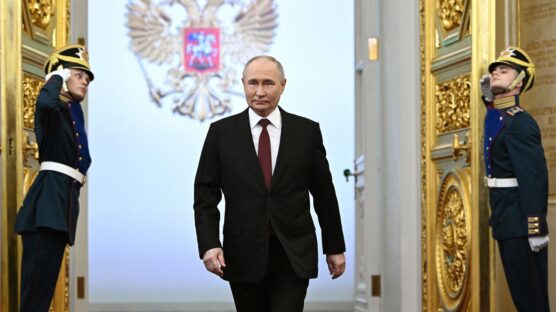Russia developing anti-satellite capability, US says
By DW
16 February 2024 |
10:41 am
White House official John Kirby said the capability is concerning but has not been deployed yet. The statement came after a vague warning from the Republican head of the House Intelligence Committee.
In this article
Related
Related
3 days ago
Friday's test demonstrated the "advantage and destructive power" of the 240-millimeter multiple rocket launcher and its guided shells, according to Pyongyang's state news outlet the Korean Central News Agency (KCNA).
4 days ago
Is Putin driving the energy transition forward? The war in Ukraine has increased Germany’s commitment to renewable energy, but the process is often hindered by bureaucratic hurdles. What’s going wrong?
3 days ago
Moscow has opened a new front with Ukraine after taking several villages near Kharkiv. Russia’s spring offensive takes form as President Vladimir Putin replaces defence minister Sergei Shoigu with another Kremlin loyalist – Andrei Belousov, the deputy prime minister in charge of the economy.
3 days ago
For the third consecutive night, space enthusiasts from around the world have had the chance to admire magnificent multi-coloured auroras dancing in the skies across the Northern Hemisphere. These northern lights are a result of increased solar activity. FRANCE 24's Julia Sieger explains.
2 days ago
he United States Trade Representative Katherine Tai said on Tuesday her office is concerned with the possibility of seeing Chinese electric cars enter the US market via Mexico. This comes as the Biden administration is looking to shield its auto industry from Chinese competitors as makes its EV transition. Also, Google launches new AI features on its search engine but faces protests over its ties with Israel.
1 day ago
Another showdown in the country that launched the so-called coloured revolutions. Georgia’s parliament has shrugged off some of the biggest protests in its post-Soviet history by approving a “foreign agents” bill that mirrors legislation in neighbouring Russia. The opposition argues it is the way for the government to curb media freedom and dissent in a country which only recently graduated to EU candidate status.
Latest
2 hours ago
Fuel queues are gradually easing off in major cities like Lagos. However, Major marketers are demanding increased supply from the Nigerian National Petroleum Company as depots stock drops. Temitope Kolade, Senior Manager, Oil, Gas and Power Unit at Andersen Nigeria joins CNBC Africa for more.
2 hours ago
Yusuf Zakariya Alkanawi created a new script for the Hausa language after discovering that the original had disappeared following centuries of interaction with Arabic and Latin scripts. The Quranic school student hopes that more Hausa speakers will embrace the new script.
1 day ago
Find these stories and much more when you grab a copy of The Guardian on Friday.
1 day ago
France has declared a state of emergency in its overseas territory of New Caledonia. Violence over a planned constitutional reform is threatening its already struggling economy. Plus, Boeing may face the criminal prosecution it had avoided back in 2021, with the US Justice Department accusing the planemaker of violating the terms of the deferred prosecution deal.
1 day ago
Approximately 100 students at Duke University have been accused of anti-Semitism after staging a walkout during Jerry Seinfeld’s graduation speech. Organisers of the walkout states the reason for the protest has nothing to do with Seinfeld’s religious identity, but rather his open pro-Israel stance.
1 day ago
France has declared a state of emergency in its overseas territory of New Caledonia. Violence over a planned constitutional reform is threatening its already struggling economy. Plus, Boeing may face the criminal prosecution it had avoided back in 2021, with the US Justice Department accusing the planemaker of violating the terms of the deferred prosecution deal.
×

Get the latest news delivered straight to your inbox every day of the week. Stay informed with the Guardian’s leading coverage of Nigerian and world news, business, technology and sports.


















0 Comments
We will review and take appropriate action.